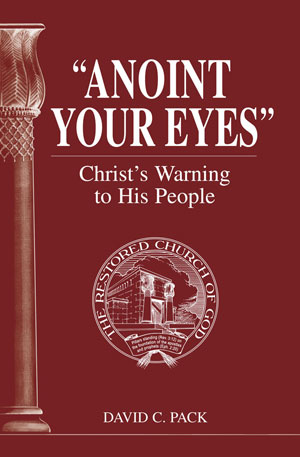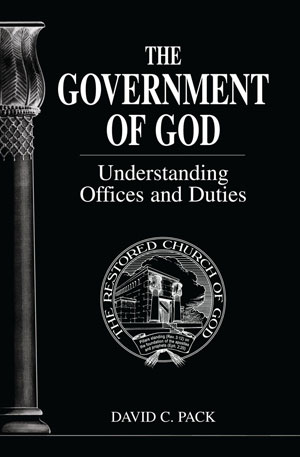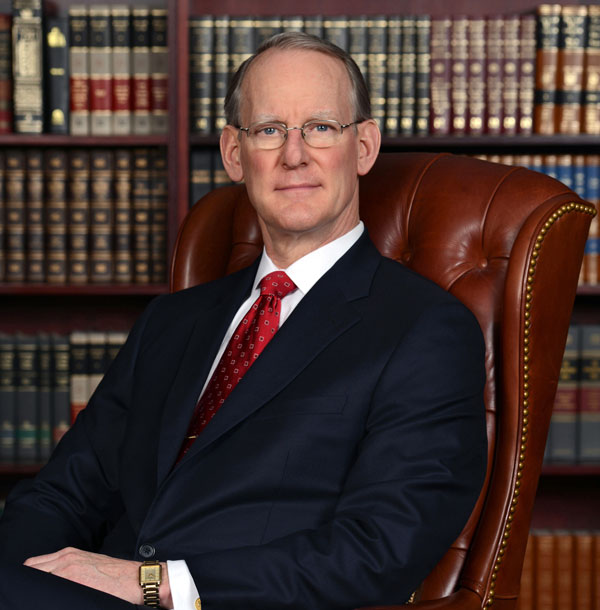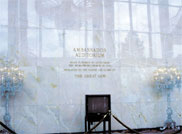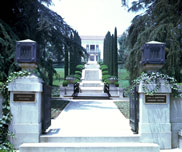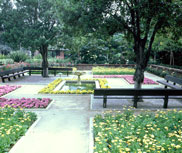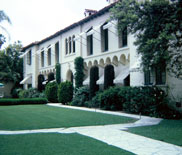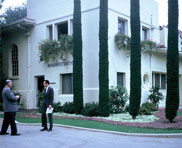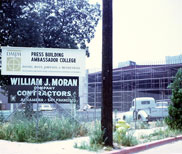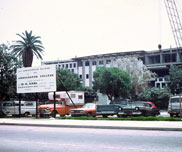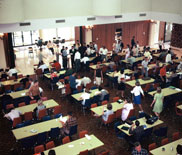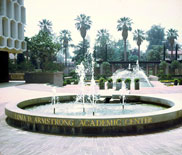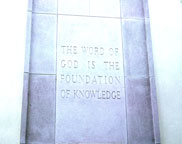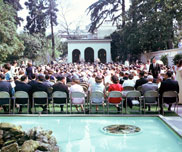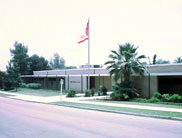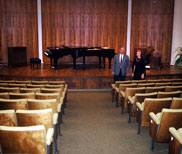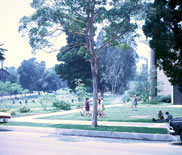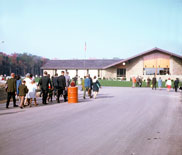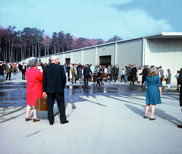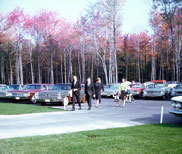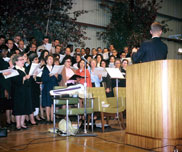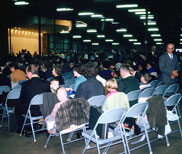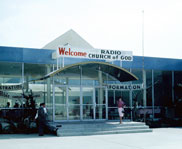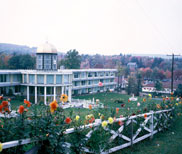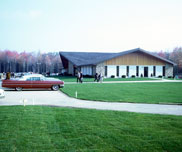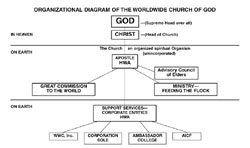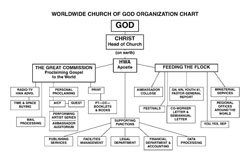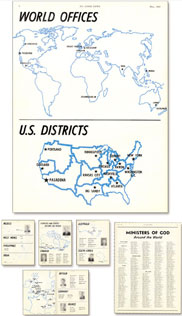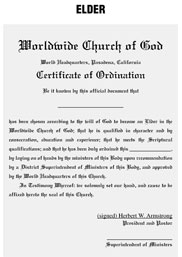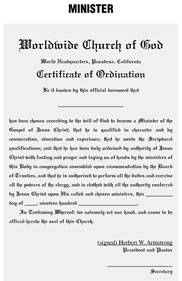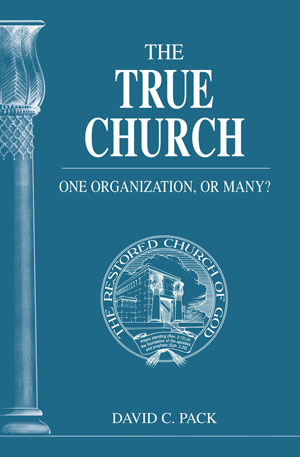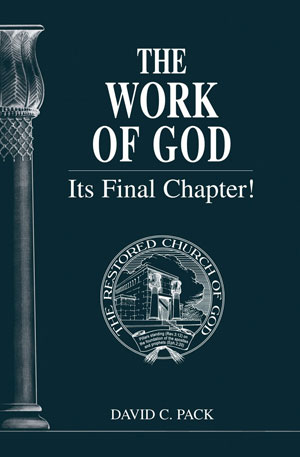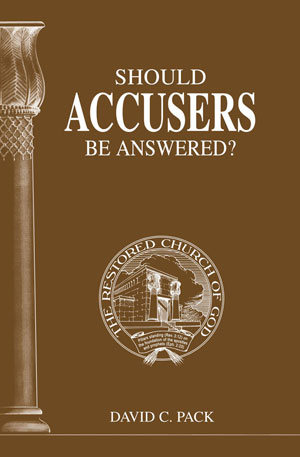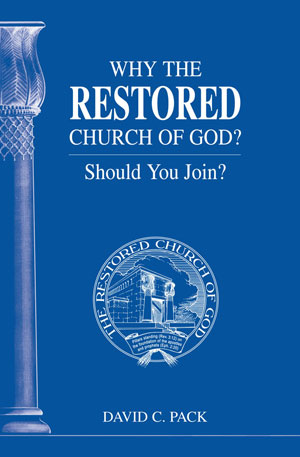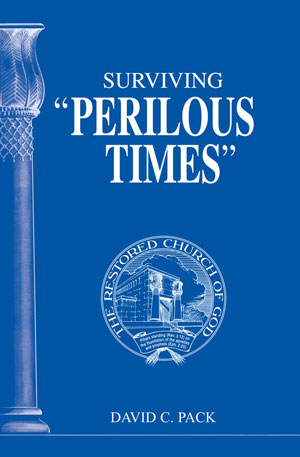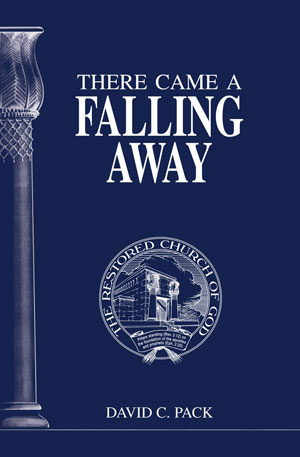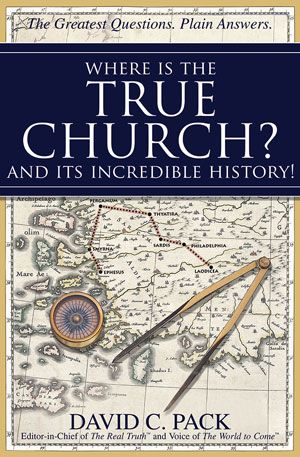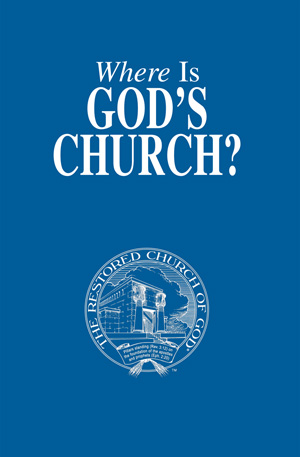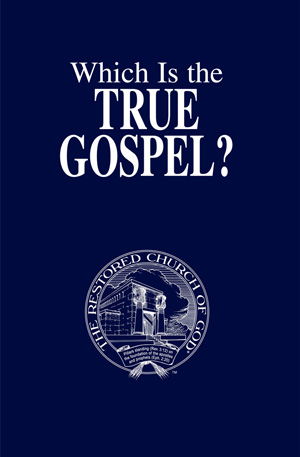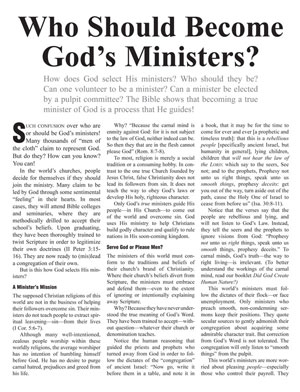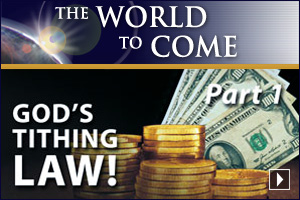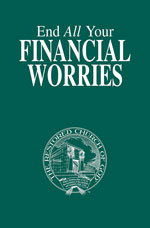The introduction warned that no punches would be pulled. That promise begins in earnest now, and means this must be the largest—and most blunt—chapter in the book. If written in “soft tones,” it could never do justice to the awful confusion that is the state of affairs within what many still think—actually assume—is Christ’s true but divided church today.
The picture in the splinters is stark and ugly, so its “reflection” must be graphic. It will also be accurate. Therefore, you are warned again that what follows will not spare. And recognize that there is simply no way to address “government” in the splinters and slivers without discussing and focusing on their leaders. This will happen in this chapter and the next, and also in a later one. And it will occur in an entirely different and unexpected context.
This does not mean that the book must engage in character assassination or smearing of various leaders or other ministers in a personal way, in the manner that politicians try to discredit opponents through name-calling. You will see that this would not be necessary, anyway, because these men have done enough damage to themselves—and in public—that their records will be seen in a new light to speak eloquently for themselves.
What will occasionally seem like mockery is sometimes used for important and proper emphasis in parts of the book. Recall the prophet Elijah, and how he knew the prophets of Baal were worthy of mockery. If you resent an occasional tone in this chapter or elsewhere, recognize it is these organizations that have effectively mocked themselves, again, in public.
Spiritual Fraud
Most people are, and certainly every student of law is, familiar with the crime known as fraud. In short, this is an act in which some form of deception is deliberately perpetrated on an unsuspecting victim for the purpose of embezzling or stealing something. In the world, fraud involves a high stakes game of confidence. Often incredibly audacious, scam artists—“con”(fidence) men—devise a scheme usually involving extreme complexity. This crime takes much forethought and can involve intricate and amazing sophistication. The jury hearing such cases must pay strict attention. There can be no daydreaming, or the value of evidence will be missed.
In the case presented here, the fraud—and you will see the methods in which it is being carried out—is being committed in the name of God, the Church and the truth, and the goal has been to steal God’s tithes and His people (II Pet. 2:1-3). In the world, those convicted of this crime usually go to prison. Of course, this does not occur when it happens among God’s people and within His Church. Therefore, the guilty must be discovered and addressed through other means.
Hold no illusions. What is being offered—what is packaged—today as “God’s government” (and in a host of different wrappings) to thousands of unwitting splinter members constitutes spiritual fraud. And you will see that the fraud is plain!
Acquit or Convict!
The goal of a prosecutor in a criminal court of law is to prove his case against the defendant charged. His assignment is to present the facts—the evidence—in a manner that is airtight. The jurors also have an assignment. They must be able to recognize what they are hearing and bring in the correct verdict.
I have the same responsibility as the prosecutor. My purpose is to present the “case” through the rest of the book, similarly making it airtight—and you have begun to see the “opening argument.”
By reading this book, you have chosen to sit in the jury box. This means that you must listen as an objective juror, accepting only the facts, evidence and proof. If I may be dramatic, your job is to assess the facts all the way through “final deliberation.” At some point, every juror is required to decide for guilt or innocence. If you remain objective—and you can cut through the convoluted gyrations of the splinter “defense attorneys”—you will see that their presentation disregards every rule of evidence, and the case for the defense is in shambles.
Do not misunderstand! This trial carries higher stakes for you than it would for normal jurors. You have a personal stake in the outcome. If you ignore the facts and decide the wrong way, and juries often do, you will be held accountable by God—the court of heaven!—and there will be consequences in the years just ahead that pass to you!
You are admonished to pay strict attention to facts presented throughout.
The Destroyer
Satan is described in God’s Word in a variety of ways through use of different descriptive terms: “deceiver,” “roaring lion,” “prince of this world,” “prince of the power of the air,” “god of this world,” “tempter,” “accuser of the brethren,” “father of murder” and “father of lies,” among others. But the single most descriptive of all of the devil’s names is “destroyer.”
Let’s see why.
Revelation 9:11 refers to Satan using both the Hebrew (Abaddon) and the Greek (Apollyon) for his role as “the destroyer.” In truth, the greatest evidence that Satan is present in any matter—either in the world or the Church—is that something was destroyed. Something was severely damaged or ruined. This could be people’s lives, friendships, families, organizations, programs, important projects in which wrong attitudes brought them to nothing, sports or athletic teams, companies and even countries. It could also be said that the level of destruction in a situation is directly proportional to how many of the devil’s fingerprints can be found in the wreckage.
John 10 describes “wolves,” “strangers,” “hirelings,” “thieves” and “robbers” at work among the people of God. The chapter also speaks about the “porter” (faithful administration) who lets only the “Shepherd” (Jesus Christ) in among the “sheep” to fellowship with them and to lead them to safety when necessary. In verse 11, Jesus is also called the “Good Shepherd” who will protect His sheep at all costs from wolves and strangers—but only as long as they recognize “His voice.” Putting together John 10:4 and 27, and coupling them with 18:37, makes plain that voice is “the truth,” or true doctrine.
Verse 10 presents Jesus’ instruction to His people regarding how to know that a stranger, wolf, thief or robber has entered the sheepfold. The second half of this scripture is more familiar, and the part usually quoted and committed to memory: “I am come that they might have life, and that they might have it more abundantly.”
While this portion of the verse is inspiring, there is another very crucial element of the passage to consider: What makes the second part of the verse, our focus here, much more powerful in meaning today is that the reader would have first read the beginning of it, the part that sets up the promise portion: “The thief comes not, but for to steal, and to kill, and to destroy.”
How to Know
Let’s summarize this in context: When things are going smoothly, and good fruits, peace, harmony, production, abundance and real success are evident and abounding within the Church, Christ—the Good Shepherd—and His government are present and leading. But when these things are absent, and have been replaced by division, competition, accusation, splitting and chaos—bad fruits—and on a wide scale, it should be obvious that the destroyer is present! And he comes in the form of a “thief” whose game is fraud.
The Christian is supposed to be on the lookout for and to recognize—and discern—these differences (Heb. 5:13-14). But most today are failing to make this connection. They have become lazy, disinterested jurors.
The many and ever–increasing number of splinters and slivers that appeared after the collapse and destruction of the Worldwide Church of God represent a picture of turmoil and devastation perhaps only a little less awful than occurred in the WCG. Much of what was described in the previous chapter has been replaced by something completely unrecognizable to those who are looking for the fruits of the government of God. Many people still do believe that God’s government is at work somewhere, but more and more are concluding that it cannot be in their organization.
The chapters that follow cannot be appreciated without first examining the almost complete wreckage—the truly terrible destruction—masquerading as government carrying God’s authority all through the splinters. Nowhere in their false teachings, which are constantly increasing in number, are the fingerprints of the destroyer more evident than in the kaleidoscopic picture of awful destruction evidenced in the many humanly–devised forms of altered governance found among them. You must come to grips with the collective mess in these organizations that has supplanted the harmony described in Chapter Two, depicting the mid-1980s and before.
The contrast between what many suppose to be the “church” of the twenty–first century and the Church of God of the twentieth century prior to 1986 is stark!
Only Through Close Examination
Let’s examine these differences in detail. We will take a look at a number of the largest splinters, as well as several of the larger slivers. Each one tells its own story. This is because every group seems to have crafted its own “theology”—often “on the fly” as needed—to justify what it is doing. Together—with the latest trends in thinking and approach among independents included—they tell a bigger story. This chapter then is necessarily direct. As with the paragraphs introducing it, the rest will pull no punches—and there is no attempt made to hide or cover up the organizations or groups described!
The reader must understand that I will periodically reference errors in thinking and teaching, sometimes very serious. But these will not, actually cannot, be demonstrated as such until later chapters present proof of exactly how—in what way—they differ in administration and practice from the Church prior to 1986. Therefore, accept that, in some cases, it will not be fully understood why these things are wrong until they can be addressed in a broader context later. The reader must be patient with the continuing need to develop the book—the case—step–by–step in the most correct way to lay the foundation for all that the Bible teaches and that Mr. Armstrong taught. The whole picture will come together in time.
Some will surely say that what follows in this chapter is an “attack” on other organizations. I have been accused of this by those who in fact attack me. Do not be foolish enough to fall for this as some have. Again, you will see that it is the leaders of these groups who are, in fact, attacking their trusting, but gullible, members who are looking to them for faithful guidance. These leaders have been able to get away with this by concocting various unusually exotic and complicated kinds of layered deceit to cover the truth of how God governs His Church. No one has been willing to “bring charges against them” and to “prosecute” their arguments, passed off as theology and growth in understanding. Thus, it is these men—and you will not be able to miss this—who have literally attacked God’s government through a veritable explosion of deception designed to destroy even all memory of previous understanding in the minds of their followers.
This is not a book they want you to read!
The Very Large, Paralyzed Splinter
Nowhere is the departure from God’s government more evident than in the United Church of God (UCG), begun in 1995. When its government is understood, it is hard to imagine that any person or group of people could have devised a method of governance and administration more different from the Bible pattern. The system this organization has created is literally fraught with political infighting and opportunity to climb, as well as cumbersome mechanisms that almost appear to have been purposely designed to checkmate progress on every front. In the name of “transparency,” UCG’s leaders also foolishly publish virtually everything they do in matters that should be decided upon in private. While they should be red-faced with embarrassment, they trumpet their errors to all without shame. But at least this makes it easy to examine how their government “works.”
So much is wrong with this organization’s leadership structure that the section devoted to it must be the largest in the chapter. Recognize that this group also commands extra attention because over one half of all those who left the WCG and entered a splinter chose to join it. However, bear in mind that what is described here still barely scratches the surface of UCG’s jumbled, tumbling, stumbling, bumbling, fumbling—and, worst of all, widespread internal mumbling and grumbling!—form of governance. Truly, these horribly misguided officials have created the very definition of administrative disaster! If you are in this organization, try to pull back your thinking and read with objectivity.
While it is hard to know where to begin, we will start with their decision in the spring of 1995 to create a representative, parliamentary, democratic, or actually more properly labeled, republican form of government, similar to modern worldly democracies.
Endless Committees
As with any democratic or representative form of government, miles of bureaucratic red tape began to appear—and fast! Exactly like the national governments of men, particularly in the West, committees and study groups began to form for virtually every need that this church could face. There have even been committees and study groups appointed to study other committees and study groups.
Contrary to Mr. Armstrong’s plain teaching—and warning!—a doctrine committee was almost immediately created so that UCG could examine all of the doctrines established in the Church through Mr. Armstrong. And this was done, wittingly or not, in the very same manner that the apostates’ example had taught them! There also have arisen an education/ministerial services committee, a member appeal committee, a strategic planning and finance committee, a youth committee, a media and communications committee, an executive committee, an advisory committee of the council and even a nominating committee of the council.
But there is also an ethics, rules and bylaws committee, which explains why there has appeared an endless array of rules in this organization following in the wake of what was already an immense set of bylaws that had to be established for practically every contingency that disagreeing elected officials might otherwise fight over. And those who know the facts will admit there have been any number of internal “struggles”—some very intense—over a variety of issues and personalities, but usually leading back to pursuit of power. And finally, no wonder then that there is also the need for an amendment committee to keep council members from being frozen at impasse when all of the previously–established bylaws and rules have not been sufficient to spell out exactly how to proceed in yet another (and another, and another) “unforeseen” situation. But even this has failed to break some of the impasses.
One is left to wonder if somewhere in a secret closet sits a specially designated—and highly motivated!—“destruction committee,” hard at work destroying this church.
This organization has proved true the axiom, “A committee is a cul-de-sac down which ideas are lured and quietly strangled.”
The Top Committee
Bear in mind that the overall organization is actually run by an elected 12-man committee called the Council of Elders, with these selected by all of the ordained men in the organization—something very different from the Advisory Council of Elders that Mr. Armstrong, as both its President and Chairman (as well as apostle and Pastor General), established by his appointment of its members to advise him. (But we will see the actual scope of the Council’s governance is still in question.)
In UCG, it is the other way around. The Council appoints the President who, in both reality and practice, is actually a President who advises the Council (for a three–year term)—making him, in effect, an Advisory President reporting to the Council. (I am compelled to say with the vernacular for those who know what this means for an organization: “It is so bad, you can’t make this stuff up.”)
This Council also appoints its Chairman. Truly, there the tail wags the “dog” (it will be interesting to note a scriptural reference in Philippians 3:2 and Revelation 22:15 about false ministers), and God is completely excluded from the process, whether or not these leaders will see and believe this.
The entire collective ministry of this splinter—at one point well over 400 men (with so many untrained men now having been wooed into the ministry), and referred to as the General Conference of Elders—votes on all important church matters, including approving budgets, changing doctrines, establishing priorities and, of course, who should sit on the Council (also for three–year terms). National councils in other countries are elected by the local ministers of these countries.
It is widely reported that as many as 25 percent or more of all of the ordained men in this organization refuse to participate in its governance because they either see the process as political or simply do not care. They are certainly correct in the former, but sadly they cannot see then that God could not possibly be in it—and that they should get out! These men seem willing to remain, however, and to send God’s tithes to those whom they know are deeply confused, politically driven, terribly doctrinally-compromised and divided in a host of ways—and who have rejected outright God’s form of government. The net effect is that they stay and underwrite a system they know is politically corrupt and spiritually bankrupt. (In late 2010/early 2011, some did decide to leave UCG due to the widespread division. This large number of ministers then formed their own new group, called Church of God, a Worldwide Association [COGwa]. Its government is no better.)
Of course, UCG’s council has found a way to justify and excuse its upside–down, broken government. Here is how they do this. They declare variously, “We are awaiting a chief shepherd” or “…God’s choice of leader” or “…God’s man” and “Our form of government is just temporary” and “We were forced to improvise with government until this man arrives.” A previous president of United told me personally in 2003 these very words, and added a comment to the effect that “Our government doesn’t really work” and “I serve as long as they will let me.” He would not deny these words.
Sadly, this decent man was summarily removed—in effect, thrown!—from office less than two years later in favor of a younger, “more progressive” man. Yet, because of this new man’s general agreement with the apostates, Pasadena handpicked him in 1993 to replace me in Akron, Ohio, at the time I was fired for unwillingness to accept what he embraced. He had accepted, by his own public and private admission(!), all of the already scores of false teachings in the WCG to that point—including the trinitarian false god! I have his sermon(s)! Of course, at predictable moments, such men often “see the light” and “recover.” And their march toward advancement can continue unabated.
Tragically, thousands of brethren seem to believe the above thinking and are waiting “in faith” for God to show them the “leader” He has chosen to “unite all of God’s people.” (Many in other groups or at home are doing the same.) In the meantime, the Council appoints—and seems to happily tolerate—such near–apostate leaders as the one described above to, they would say only “temporarily,” keep the home fires burning while waiting for “God’s appointed leader.” Not only will the man they envision never come, but they would never follow God’s kind of leader, as they pretend to hope for, unless tremendous miracles accompanied that man—something God has never done in Scripture or at any time in the New Testament era following an apostasy.
Mass Resignation to Lower “Office”
There was a time when every minister and elder in the Worldwide Church of God believed, or at least seemed to believe, that he had received his office within Christ’s Body (I Cor. 12:18, 28) from the living Jesus Christ Himself.
Prior to ordination, extensive recommendations were made (the form for this is shown and examined in a later chapter) and approvals took place through a process that, again, all ministers and elders seemed to understand. There was no mystery. Each time a man was ordained or raised in rank to higher office, that process began again, with the knowledge that Christ, the Head of that Church, had made the final decision. A form was submitted. Faith was involved. So was God’s government.
At its outset, in an unbelievable act of mindless conformity and “lemming effect,” the hundreds of ministers who began the United Church of God all agreed to simultaneously give up their offices, no matter the rank, and simply refer to themselves as “elders.” This designation was now to apply equally to evangelists, pastors, preaching elders, local elders and local church elders. All were now simply elders, with their “rank designation” entirely based on what their exact function or assignment would be at any given time.
Incredibly, evangelists of decades standing gave up their offices in the stroke of a moment. So did Pastor–rank ministers of similar seniority. In other words, these men decided that, if they were not actually “evangelizing” or actually “pastoring,” they should not be considered to any longer hold these ranks. Yet, in the past, there were always pastors and evangelists, a great many of whom served either at Headquarters or in a regional office, or within the colleges, who did neither of these things. These men never popped in and out of their offices—meaning their ranks—because of job changes, like so many jack–in–the–boxes. (In fact, this was the case on numerous occasions in the WCG with many of this splinter’s senior men.)
We must ask: Did these men never believe that it was Jesus Christ who had put them into their offices? Did they believe Mr. Armstrong and others were not led of Him, and made an error in judgment by approving their promotions in rank? Tragically, these men simply forgot what these offices meant—and that they were ranks within God’s government. They lost sight of the fact that they had no right to overrule Christ’s decision so that they could all be “equals.”
It must be recognized that the idea behind their decision—and this was openly stated—was to introduce a form of democratic governance over the “church,” in which decisions were made by “one man, one vote.” The chief goal was to attract as many local church elders and ministers as possible into their fellowship with the promise that—from senior evangelists to junior local church elders—they would all carry equal weight on Church–wide matters. Political motives create political environments—and vice-versa.
In this regard, you need to ask yourself if ministers of Jesus Christ can by their own authority reduce the office given them by the Head of the Church to a lower one. We must ask: Could a man promote himself to a higher office? Of course not! Then how could so many believe themselves authorized to reduce their offices?
An Inset From Mr. Armstrong
What we have just described commands an inset to the chapter. While we will generally be quoting Mr. Armstrong much more extensively later, we need to let him, as the one who signed their ordination certificates, address what all of the senior ministers in UCG did in their mass action.
This was not the first time that the question had arisen about whether there is a difference between rank and function within the offices of the New Testament ministry. This problem arose in the “liberal years” of the mid-1970s, and Mr. Armstrong addressed it. He left no doubt that the various ranks of the ministry were, in fact, ranks— specific offices! A man’s designation did not move with his function, duties, responsibilities or particular job assignment at any given time. When the man was ordained to a certain office, that was his rank in Christ’s ministry, and it did not change!
You will be able to see exactly what Mr. Armstrong wrote to the entire ministry in 1979 about this matter. Bear in mind that virtually all, if not every single one, of the senior ministers who reduced themselves to “elders” in this organization in 1995 would have received the Pastor General’s Report explaining what you are about to read. Notice the very title of the article (at the end) written to the ministry, and take special note of the last sentence, given all caps for emphasis by Mr. Armstrong:
“I hope it is understood that designation of ordination as Evangelist, Pastor, etc., refers—and always has—to rank [emphasis his], rather than assignment of activity.
“As I recall at the moment, none who have held Evangelist rank have devoted themselves to holding evangelistic campaigns—preaching to public audiences regularly in proclaiming the Gospel Message to the world.
“The nearest exception to that, as I now recall, is that Mr. Rod Meredith held two or three campaigns, with public invited, in England more than twenty years ago. My son Garner Ted held occasional two- or three–night abbreviated campaigns a number of times, taking along on some of them singers, M.C., etc. He also held an evangelistic campaign of some weeks at Springfield, Missouri, in the late 50s. A few others of Evangelist rank have held a few occasional one- or two–night campaigns.
“But none has been occupied regularly in holding evangelistic campaigns preaching to the outside public.
“For years Mr. Norman Smith, of Evangelist rank, was occupied in supervision of radio and TV Production. For years Al Portune was occupied in the Business Office, handling finances. For years Mr. Les McCullough, ranked Evangelist, was executive in charge of the Big Sandy campus of Ambassador College. For years Mr. Raymond McNair was occupied as Deputy Chancellor of Ambassador College in England, as he is on the Pasadena campus now. And so with the others—none has been occupied in evangelizing the outside world, though many have spoken more or less often, on the Sabbaths, to our own congregations.
“In I Corinthians 12, the various functions in Church organization are explained. ‘There are differences of administrations, but the same Lord’ (verse 5). Different administrations require administrators—and that is listed first in the designation of duties within the organized Church. Most of our administrators have been ranked Evangelist.
“Next, ‘And there are diversities of operations’ (verse 6). This can include all other specially designated operations within the Church, devoted full time (not laymen necessarily). For these many varied functions in a united, organized, cohesive Work, God has given various ones special spiritual gifts—dividing to each as GOD wills.
“Then, same chapter, God has set in the Church, apostles, prophets, teachers…governments. In Ephesians 4 this is amplified a little further: apostles, prophets, evangelists, pastors, teachers. It is apparent these are intended to be ranks, rather than definite occupations. AND THAT IS THE WAY GOD HAS SET IT IN HIS CHURCH TODAY!”
“Evangelist Rank Is Designation Of Rank—Area Of Operation,”
Pastor General’s Report, October 24, 1979
There are only two possible explanations for why scores of senior ministers did not follow this instruction. They either forgot it—or they rebelled against it. We can naturally wonder if all of them could have forgotten in unison such an understanding—and official ruling. No serious person could believe this, and we could conclude that if just one or a few had “remembered” Mr. Armstrong’s teaching, would they not have reminded the others of what they were doing?
Voluntary Resignation!
Grasp this. For one of these two reasons, these men voluntarily resigned their appointed offices in Christ’s Body. Make no mistake about the current rank of all the senior ministers in UCG. These senior men formally resigned their higher WCG offices many years ago! While deceived, they chose to do what they did. Worse, this decision in itself formally disqualified these men from holding their old offices and, when truly understood, from the ministry altogether. They have straight out rejected where Christ put them in His Body (I Cor. 12:18). Do you think that He could still use—work through—such men?
Consider further. When men do this for any reason, they cannot later decide of their own accord—should this become desirable—that their actions were wrong and then reinstate themselves. Under no circumstances does the Bible ever permit men to reinstate themselves to the ministry either after involuntary removal from office or resignation. Let’s state this plainly again: After having rejected, and for many years now, the calling of Jesus Christ to an office—any office—such men are officially disqualified from that office until, upon sincere repentance, they are formally—meaning officially!—reinstated by the higher true authority in wherever God’s government is. Laugh and sneer as they surely will at this explanation, these senior men have wholesale left the ministry! They are simply no longer true ministers—period! These men are in no sense Christ’s ministers, any more than they are “united.”
On the basis of what you have just read in this section, can you begin to understand more about how God could not possibly be leading a government formed by men whose very first action was to outright reject the very offices into which Jesus Christ had placed them?
As you read the next section, keep asking yourself how an organization over 15 years old could be lost in such a maze of ignorance and confusion.
By Their Own Admission
At least this organization has been somewhat “honest” about the Frankenstein form of government it has created. Its January 2006 church newspaper contained a telling article titled “Role of the President in International Areas.” The article opened with a statement that the Council of Elders had surveyed ministers in the international areas about their view of the president’s role. In practical reality, this means that the “dog” consulted with its “tail” for instruction on how to—and even permission to—wag it!
The article referenced one Council of Elders member as stating, “…the responses to the survey went in a different direction than was anticipated and opened up even more fundamental issues for discussion.” It reported that this Council member wrote the Council Chairman “that confusion ‘…in the international areas regarding the role of the president internationally is to some extent…due to a lack of clarity with respect to how the Council and president should function.’” Incredibly, no one recognized that human nature had been given a voice.
The article continued with this same man asking the rest of the Council “to consider some questions about those foundational concepts. What is the United Church of God? Are we merely an association of independent entities around the world with no overall global central administration? Are we just tied together by certain doctrines or policies, but not by a common administration?…does the United Church of God transcend national boundaries and legal documents? Are National Councils the supreme administrative authority for each area? Or do they recognize an authority over them? If so, is that authority the Council of Elders?”
How many members and ministers understood the seriousness of what is in question here? Even though this organization long ago published a “study paper” on this aspect of its governance, the article continued with the Council then “point[ing] out that we have a common vocabulary, but often don’t have common definitions for our words. For example, what is the meaning of ‘governance,’ ‘administration,’ ‘association,’ ‘micro-management,’ etc.?” Astonishing.
The article also referenced another Council member—this is almost too incredible to believe—who, the article reports, “stated that the fear some international areas have, based on history and experience, is that the ‘strong arm from Headquarters’ will try to take control. He said that it is important to coordinate with international areas, not to control them.”
What?!! “Coordinate”?!! Every form of government must involve control. This is what government IS! Government means governing!
However astonishing this is, what may be the worst from this article is saved for last. The Council Chairman himself declared this: “There are fundamental questions about what leadership is, what authority is and who has it.” Absolutely incredible! I am compelled to repeat, “You cannot make this stuff up.” One could wonder how so many could follow such leaders, and for so many years.
But there is more.
No Wonder…
No wonder the United Church of God refers to its “capitol” as “home office” instead of headquarters. No wonder it customarily sends regular monthly letters to its membership signed by two men—the Chairman of the Council and the President, both of whom also merely consider themselves “elders.”
No wonder UCG calls itself “an International Association”—with this because its leaders and ministry no longer understand who or what is the Church and Body of Christ, and that Christ always intended His Church be much more than a mere “association” of similar congregations. (Mr. Armstrong thundered against this kind of human “affiliation.”) As the next natural byproduct of such a spectacular and catastrophic collective memory loss, no wonder the leadership in this organization cannot any longer recognize the need for God’s pattern of government—or even what that pattern was.
No wonder local congregational boards were permitted at the outset, even though the home office was forced to renege on this promise because they faced too much of the kind of chaotic government at the local level that they wanted to reserve for their “home office.” No wonder local pastors sometimes permit teenagers and unqualified others to speak from the pulpit, little children to take up offerings on Holy Days (thinking it “cute”), and do other things reserved for duly–appointed deacons and leaders. (They have forgotten that it was the apostates who taught them to break with “decency and order”—and established tradition—with these ideas.) No wonder the true gospel—a message about God’s coming, world-ruling government—has been rejected by this group in favor of one half-mirroring the world’s gospel about “Jesus” and His “forgiveness.”
No wonder ministers polled certain local congregations to see if the people preferred an opening prayer before or after the songs that open the service—or if the people did not. No wonder that addressing and referencing ministers and other officers as “Mr.” has disappeared in much of UCG. (It comes as no surprise that this evidence of disappearing respect for offices of God is also visible in virtually all of the other splinters and slivers.)
Again, no wonder its Council publicly declares it is still “unclear”—and this done seemingly without the slightest embarrassment—how the respective local councils of other nations should report to either the President or the Council at the home office. No wonder this organization, over 15 years later, is still studying how that President interacts with the Council.
These “no wonders” could go on and on, because there is much more wrong with UCG’s atrocious governmental structure. In fact, this organization is best described as a breeding ground—a virtual training school—for opportunists, climbers and those for whom political thinking comes naturally. While there is temptation to continue, even a description of this group must have a limit.
In late 2010 and early 2011, the United Church of God lost several thousand members and over 150 ministers to a new organization—Church of God, a Worldwide Association (COGwa). Born after a long, internal and disgraceful public fight, COGwa leaders built a near clone of the UCG government they left behind. By any reckoning, the differences are so minor one can only wonder why a separation took place. The facts demonstrate that no other doctrines seemed to be driving UCG’s latest split. By all accounts, ministerial egos were the cause of so much additional damage to the brethren.
A final acknowledgement—and admonition: The travesty occurring in the name of “government” that is being perpetrated by these two organization’s leaders lies equally at the feet of their memberships. The home office could never have gotten to first base if brethren there were not sending tithes and offerings to empower it, now them. Fraud, spiritual or otherwise, often involves co–conspirators, and these organization’s leaders have unwitting thousands.
Armed with right knowledge, however, individuals can choose to be different!
The Big Pentecostal Splinter
The Living Church of God (LCG) claims to be the “living branch” of God’s Church, was formed in early 1993 under a different name (the Global Church of God), and also consists of thousands of people. Having undergone a name change in 1998, it is still led by a self-proclaimed “senior evangelist,” Roderick Meredith, who constantly speaks of having spent “thousands of hours with Mr. Armstrong.” LCG does not practice the same mistakes of government as those described in UCG. Its errors are different and more easily summarized, but they are also several in number and gravely wrong.
It is important to realize before continuing that Satan has always been willing to permit the churches of his world to teach different kinds of error. Unlike God, he does not require uniformity among his followers. He knows error is error—heresy is heresy—false teaching is false teaching—and that it fulfills his purpose in every form. The devil’s goal has been consistent—to overthrow and destroy the government of God, and he is more than happy to offer God’s people a variety of wrong patterns from which to choose to achieve his end. Ultimately, no form of government error is better or worse than any other.
A side note is important here regarding LCG and UCG. These two splinters have periodically quietly held meetings toward the express purpose of an eventual MERGER. While most of the membership of both are probably unaware of this—there are the usual denials—many know of the process. There have been meetings involving both groups, formal and informal, and held at different levels in different places, including at LCG’s headquarters. Details of leadership are reported to be the sticking point. But, because of “flexibility,” the differences in government—as well as other doctrines—will evaporate in time. These facts will almost certainly be denied, as they were in 1998, when I witnessed the same thing firsthand.
One or Three?
First, this organization has changed the biblical pattern of offices once practiced in the Worldwide Church of God, and has introduced new titles, among other errors.
Mr. Armstrong explained that there are three kinds of elders (this will be more clearly understood later) with “elder” in the name, and most readers are familiar with them. These categories functioned in three offices: Preaching Elders, Local Elders (those in the full–time ministry) and Local Church Elders (elders who are not full–time). Roderick Meredith has done away with all three designations—three offices—and merged them into one office, that of simply “elder.” He claims that Mr. Armstrong created the office of Preaching Elder as a kind of maneuver to “satisfy the draft board” in the 1950s. This is patently false, as well as silly, and you will see Mr. Armstrong’s own description of how this biblical office fits into Christ’s ministerial hierarchy.
With this leader’s merging of three offices, not only is all distinction between these then lost, but the office and rank of Pastor—that of the most senior ministers under evangelists—is significantly diminished. The experience, importance—and level of respect to seniority—that this rank once represented in God’s structure largely disappears in this system. In practical application, this organization routinely raises men (sometimes also young men) of minimal training and experience to “Pastor rank.” Of course, and this is a real problem, such promotions play wonderfully in stroking younger, more junior ministers. This alteration also serves to automatically create an environment that is more political. Inexperienced men ordained and raised to this office will naturally feel that they have quickly risen to higher rank. They will feel themselves to have “arrived”—meaning they have “grown spiritually” at “unusual speed”!
Gone and forgotten are the all-important admonitions of I Timothy 3:6 (do not ordain novices or pride will lift them up) and 5:22 (avoid sudden decisions to ordain, where proper thought and discussion were obviously lacking).
More obvious, however, is the basic fact that three offices of God, once held by many hundreds of men when the Church was on track, have been thrown out the window in LCG’s ministerial structure. (Many will be able to remember that local elders—those full-time—were always to be considered of greater office than local church elders.)
New “Presiding” Office
Recognize that this change was unilaterally instituted by a man who has also created a new title for himself—Presiding Evangelist. (We will ask momentarily whether he actually takes a very different and higher level of authority than that of evangelist.)
Mr. Armstrong never referred to himself or anyone else by this title. We knew he was Christ’s apostle, and he never referred to himself as “Presiding.” Also, we understood he was the Pastor General (or “general pastor”) because he supervised all congregations, and he referred to himself as such. And, of course, he was the President and Chief Executive Officer of the Worldwide Church of God, as well as the Chairman of its corporate Board of Directors.
Not only did Mr. Armstrong never give this designation or use this term, neither does the Bible. It is mere human invention, and breaks with plain understanding of evangelists as the third office within the Body of Christ, and thus one that would not “preside” over the Church as a whole. Many do not realize that Mr. Armstrong thought himself to have been leading the Church as an evangelist for 19 years—from Autumn 1933 to Autumn 1952—until he recognized this was erroneous thinking, and God revealed to him how it was to be corrected. This story will begin to be understood in Chapter Five, but will be more fully explained in a later chapter.
As with UCG, and directly related to the humanly devised title he has taken, Roderick Meredith established a Council of Elders. He also dropped the word “Advisory” from its description. Obviously, because he no longer either understood or held to other elements of God’s government practiced in the past, he had no difficulty making this change. When I sat on his Council (for about four years prior to Restored’s inception), I asked him in its first meeting, why he did not use the word advisory. I was direct. He explained that “he was part of the Council” and that he should be considered “just one of the men on it.” This was his explanation.
The Council in this organization is also vested with the authority to change official church teachings—doctrines—by two-thirds vote. In this way, they are little different from UCG, except that the latter is more honest in publicly admitting what they are reviewing and what has been decided—because the entire ministry participates.
The reader can easily investigate whether this is true.
Also like those of UCG, the ministry of this so-called “living” organization looked the other way and permitted all of these changes. They should never have accepted alterations in God’s government that they in fact, at least in most cases, received with open arms.
“Restoring Apostolic Christianity”
Before continuing, and again as with the leaders of UCG, recognize that Roderick Meredith does not understand Mr. Armstrong’s role as the final prophesied Moses, foretold to come (Mal. 4:4) ahead of the end-time Elijah who would “restore all things” (Matt. 17:11) to God’s Church before Christ’s Return (Mal. 4:5-6). This ignorance of fulfilled prophecy paves the way to a host of connected problems in leaders who reject the understanding of this fulfillment—what it means to the Church. Let’s see how this has affected the thinking of this leader, and what it has to do with government in LCG.
Many will remember that Mr. Armstrong repeated over and over, and the introduction cited several examples, that God raised him up more to re-establish the government of God in the Church than for perhaps any other reason (except for the co-equal importance of re-establishing the true gospel, which is entirely about God’s government). Of course, Mr. Armstrong did bring a great many other truths to God’s Church, but he believed the ones about government and the true gospel to be the most crucial—and he also said as much more than once.
Here is what has happened in LCG. Roderick Meredith and those he calls his “lieutenants” seized on the idea of constantly repeating and emphasizing the theme of “restoring apostolic Christianity.” In so doing, this man is affirming what many know to be his private desire to be the Elijah.
Have you recognized this? Have you grasped its significance—what it means?
Here is another problem with this: As an evangelist, Roderick Meredith sees himself as chosen and led to “restore apostolic Christianity”—in other words, the way of life first taught through apostles—to the Church. Here is the incredible irony in this. He is saying the man who was an apostle—Mr. Armstrong—apparently never did this, but as an evangelist, he would and is!
Take special note that this man has linked his view of what he sees as the “restoration” to an emphasis on performing “miracles” and demonstrating “great power,” like the original Elijah, so he can “shake the nations.” Of course, similar to Simon Magus in Acts 8, however obsessed this leader has become with such gifts, I tell you on God’s authority that he will not be given this power—at least not from the true God. It is in this area—that of spiritual “gifts” described in I Corinthians 12—that LCG’s leader has become obsessed, coveting the power of miracles, especially to heal. Of course, who would not be in favor of healing? However, all who truly still believe God heals would know this occurs only in the Body of Christ, for those with simple faith.
The understanding of true and false miracles will be covered in greater detail, and in a fascinating context, in Chapter Eighteen. However, those with serious interest will want to carefully listen to my vital three-part sermon series “Understanding Signs, Wonders and Miracles—True and False!” You will be left stunned at what is at stake within this subject. You will also understand that miracles and even special miracles are part of the signs and wonders that are the “signs of an apostle”—not of an evangelist working without an apostle’s authority.
“Another Gospel”—and a Curse!
We must ask: Is it really any wonder this “senior evangelist” would pervert the New Testament offices of Christ’s ministry, and invent for himself a new title—or alter the name of the Advisory Council of Elders? Of course not! He cannot possibly believe Mr. Armstrong restored God’s government to the Church any more than he believes Mr. Armstrong restored the true gospel to the Church. This is because this man has also perverted this central, titanic truth in favor of “another gospel” (II Cor. 11:3-4). Like UCG, he has shifted halfway to acceptance of the world’s focus on the Messenger (actually, when understood, on “another Jesus”) instead of His message. LCG, again like UCG, also lists Christ’s forgiveness of sins as the first element of the gospel. The reader should take a moment to read and be sobered by what Paul said about the double curse related to this in Galatians 1:6–9. In losses of astounding proportion, over 70 percent of LCG’s original ministry has left the organization (for various reasons), retired or died—often suddenly or tragically—since 1995, but most since late 1998, with 2004 and after witnessing a dramatic acceleration.
Time will demonstrate that Galatians 1:6-9 reveals this process and other worse problems to be ongoing—far from complete in LCG. In fact, as this curse takes greater and greater effect in the large splinters (and any others who adopt this false gospel), their problems will continue to grow in a parallel and commensurate intensity.
You must understand the reason God places a double curse on those who pervert the truth of the gospel. (Ask: How many other doctrines are even connected to a curse?) It is because the gospel is only about the coming, world-ruling government of God!
God no more wants this message about government perverted before all nations than He wants His government perverted in the Church! Woe unto those who pervert either!
How ironic that LCG and so many other splinters happily put Christ where He is not and does not want to be—as part of the gospel! Yet, they refuse to acknowledge Him where He should be and declares that He is—the Head of His one, undivided government, leading a single organization!
But how many will see the fuller, bigger picture here? How many will be able to connect all of these different elements in Roderick Meredith’s thinking?—and to LCG’s fruits? How many will be outraged at such an appalling focus on himself and subtle—but clear—denigration of Mr. Armstrong’s true fulfillment and establishing of many vital doctrines? How many will see why this man freely changes any number of other doctrines? How many will connect the dots to why he feels that establishing the right form of government in the Church is his role, instead of Mr. Armstrong’s?
What Office?
There is further evidence of Roderick Meredith’s desire to elevate himself, and this will become more evident when we examine the duties of an apostle in Chapter Twelve. Despite the appearance of “lowering” himself into his organization’s Council, this man has actually elevated himself by taking almost every responsibility—at least seven!—exclusively given to, and designated as functions solely of, the highest office in Christ’s ministry. When we come to them, members and ministers of LCG will want to focus on the duties of this highest office with their leader in mind, as well as on Chapter Nine, which will explain what the Bible teaches, and what Mr. Armstrong taught, about the rank and duties of evangelists. Chapter Thirteen will also address false apostles in more detail.
If honest with the facts that will be presented, these readers will be left with the question of whether their leader is in fact a false apostle! Of course, this leader does not actually claim to hold this highest rank. However, we must ask whether that changes the truth—the net effect—of his actions.
I am aware that this is a most serious question—in fact, how many could be more serious?—but you be the judge in later chapters, when this is covered in greater detail, of whether the facts have been honestly presented. For instance, the leader of the next splinter to be discussed takes at least a dozen titles that belong only to Christ or the Father. While he certainly does not refer to himself as God or Christ, or think himself doing anything wrong, he is no less a false christ. We will also later see how this is true.
This introduces the next section about the splinter this man leads.
The False Prophet Splinter
The leader of the Philadelphia Church of God (PCG), Gerald Flurry, claims to be a prophet. But the Bible teaches, and this will be made clearer in Chapter Ten, that no one can hold the office of prophet unless there is a living apostle to whom he can report. Also, a prophet can never lead the Church, because this rank is not now, and has never been, an administrative office, or even one involving general preaching and teaching. Again, that will be made clear.
Before continuing, it is important to note that there are also several small slivers led by men claiming to be prophets. And more are appearing. Note also, however, that these “prophets” all work in opposition to one another, each offering differing prophetic scenarios, theories and “insights.” Suffice to say regarding such men, they cannot be true prophets. Every one of them is false.
Again, Gerald Flurry takes perhaps a dozen different titles and offices that apply solely to either the Father or Christ (he takes more than 30 titles total). This is outright blasphemy and rank idolatry of the highest order. This man is worse than a false prophet, and even a false apostle. By taking just a single title of Christ, never mind having taken at least a dozen divine titles, such a leader has made himself a false christ in the fullest sense!
When presented with the facts, no serious person would believe such a man has anything whatsoever to do with the government of God—and none should follow him to the kitchen, let alone the kingdom of God!
It is worth noting—and this is important in regard to PCG—that the true government of God is benevolent, loving and a wonderful blessing to the people who serve under it (and yes, again, it is understood that it is not perfect, and that there are mistakes made by every human within it). But the type of government practiced within this bizarre organization—and they take special pride in describing themselves as “having the government of God”—is so dictatorial, brutal and despotic that any honest observer could not differentiate it from the worst forms of tyranny. The WCG apostates proved that much more than outward appearance and pattern must be present for the government of God to be present. (But PCG has also rejected the pattern in numerous ways.)
Truly, and this is difficult to say, people there would be better off under either of the groups already described than to stay for even five more minutes under the so obviously error-driven, demon–inspired leadership of this organization.
The Intellectual Splinter With “Vision”
In 1998, approximately 1,500 to 2,000 people departed from UCG and formed their own new organization under a newer (post-1986) WCG evangelist. Copying the churches of the world, who see themselves as having a place as one of many “communities” within a kind of amorphous whole of the supposed body of Christ, this group chose to call itself “an International Community” of believers, after the evangelical term popular today.
David Hulme led the separation of those who followed him basically under the following scenario: UCG had twice elected him as its President about eight months apart in its first year of operation. However, the Council of Elders three years later decided it was time for a change. This man immediately swung into action, and here is what happened.
This “evangelist” simultaneously came to what amounted to two opposing conclusions. As “winner” of two separate elections, he felt this meant he was God’s winner—meaning God’s electee—and that he had been selected to be “leader of the church.” Yet, and here is the problem, he simultaneously believed he should publicly “repent” of having participated in such a political process. This meant he had to “repent” of having taken part in these elections, but accept that God had, in fact, revealed to him through his initial installation born of rebellion—voting!—that he must step out on his own as the church’s new “leader.” Unbelievable! (It is understood that there were a couple other differences behind the division between the groups. And it should also be understood his organization has forsaken numerous other true doctrines.)
Tragically, this group’s leader has now finally written a book—which, incredibly, he SELLS for $65! Having lost all grasp of how only Christ, at His Return, can solve the problems of the Middle East, he offers a “path to peace” in this impossible region of the world. Having rejected Matthew 10:8—“Freely you have received, freely give”—how could this man possibly remember and understand how the all-powerful Christ alone can solve the world’s great problems.
He could not!
The description of the government in this group can also be relatively short because its errors are similar to the second group above. The “intellectual” evangelist leading this breakaway splinter has also taken many of the duties designated to be carried out solely by apostles. The membership there should also carefully examine the facts presented in Chapters Nine and Twelve.
The Small, Upside-Down Sliver
When the Global Church of God (formed in 1993) eventually split in late 1998, with the majority forming LCG, over time, several smaller groups formed from the approximately 20 percent that had remained behind. While each of these tiny groups carries its own story, one stands out as having invented a new kind of confusion, not previously seen after the apostasy.
One of the slivers that emerged eventually came to believe itself led by its very own “evangelist.” Here is what happened: In early 2005, several elders and one pastor gathered around another thought-to-be pastor in their group and “raised” him to “evangelist.” However sincere, this man was trained almost exclusively in a very different endeavor, and possessed little practical experience or training of almost any kind in the ministry. (He was not even an elder in the Worldwide Church of God, and yet was ordained three times in two organizations thereafter.)
Of course, the idea that this “evangelist ordination” could be valid is ludicrous in the extreme to anyone remotely familiar with the truth of the Bible. However, this did not stop the group from “researching” the Scriptures until they supposedly “discovered” that the apostles Paul and Barnabas appeared to have been ordained apostles by the authority of lower-ranking men who were only “prophets and teachers” (Acts 13:1-3). I have read their explanation, and it is at best misguided, and at worst, pitiful and comical. But so is this organization’s convoluted and embarrassing continual references to how such thinking—and they offer any number of instances of this with various teachings—is evidence of ability to “grow beyond Mr. Armstrong” (with such “growth” portrayed as a command to Christians). Of course, this thinking of “going beyond Mr. Armstrong’s level of understanding” is common to every splinter and sliver. A few may have simply not recognized it.
There is not space here to explain the true circumstances in Acts 13, but Mr. Armstrong himself will make clear later in Chapter Nine what really happened when Paul and Barnabas were ordained—in other words, under what and whose authority this occurred.
To its credit, this little group is at least trying to do a tiny “work” of sorts. I know these men, and they are sincere but, as Mr. Armstrong would say, “They are sincerely wrong!” Hopefully, it will eventually be evident to a few more in this group that this “ordination” was bogus and their “work” has been of men.
In any event, when one who is not even a properly ordained minister, let alone evangelist, takes to himself responsibilities designated to apostles, the problem is only compounded. Such efforts to do the Work are still false, are contrary to the way God’s government operates, and are not led of Jesus Christ.
Another “Evangelist” Sliver
A more recent sliver—Church of God, 21st Century—led by a man ordained evangelist in the early 1950s, appeared in early 2004, and several hundred people quickly associated with it because of his name. This small organization presents a different and unique government problem, related to what all the elders in UCG did.
Some history: In late 1998, the leader (who died in October 2008) of this group parted company with LCG for about a year and a half. He later had second thoughts and decided to return, which he did for approximately three years. It was explained to him upon his return that he must give up his office as Evangelist until those over him felt he had sufficiently “repented” of “rebellion.” He voluntarily and publicly agreed to the terms, and thus was completely removed from the ministry for over three years. When his reinstatement did not come when or as he had hoped—his “jailors” were considering reinstating him to much lower office—this man left this organization for a second time and declared that he was an evangelist once again.
We must ask: Can this be done? Can a man reinstate himself into the ministry after voluntarily leaving his ministerial calling—and in this case for over three years? Is his action legitimate? Does he again carry authority—in the case of his office, more than a little?
Let’s carefully analyze what happened, let’s reason together in the light of how God governs His Church. Recognize that there have been men who were removed from the ministry and later reinstated. For various reasons, this has occurred numerous times through the years. (Of course, I am not speaking of those who were unwillingly removed from the ministry for wrong reasons—cases in which a man refused to go along with false teachings in order to keep his job. I have experienced this twice and, believe me, I know the difference. You should, too.)
When this man voluntarily divested authority over his office to an organization (LCG) that he was in fact re–entering, he understood exactly what he was doing, in his case, having considered the decision beforehand for many months. He knowingly handed away his credentials to an organization he recognized later—now for a second time—was false. When this man checked his ministerial credentials at this splinter’s door like they were little more than a coat, his decision not only dishonored Mr. Armstrong, the faithful human apostle used to install him into office so many years before, but he dishonored the Apostle above Mr. Armstrong—Jesus Christ (Heb. 3:1)!—Whom he presumably believed guided his original appointment and ordination into office.
Here is the point: By allowing this organization to remove him from office without true cause (except in the view of the leaders there)—and doing so with his eyes wide open—this man utterly disqualified himself from that office and from the ministry. Naturally, he later regretted his decision. But, as Esau found with his birthright blessing (read Hebrews 12:16-17), it was too late! Seeing no other option, the man simply reinstated himself. But this man had absolutely no biblical authority to “reinstate” himself, particularly after committing such a monumental offense against Christ’s decision to place him into high office.
The reader might try to find in the Bible where any man was ever permitted to leave the ministry (and for so long) and then reinstate himself on his own authority. There is also no such historical instance—no such confusion—that one can point to, either in the Philadelphian era or in any previous era, where such a thing occurred. Some seem to believe that because we are in the Laodicean age, this sort of rebellious confusion can be acceptable. Various former ministers and brethren who follow him seem to think in such cases that because misguided, foolish flatterers—other brethren or ministers—tell them that they are playing an “important role” or “making a difference” (the case with this man), self–reinstatement is permitted. Who are they kidding? Certainly not thinking people who understand anything about the government directed by Christ as it was given to the Church through Mr. Armstrong!
In a sense, the over 400 “elders” in UCG who transferred authority over their office to their organization have been more honest than this man and certain others. However wrong they were, at least they admitted openly that they were all agreeing together to reduce their ranks to achieve “one man, one vote” in their General Conference of Elders. If, as explained, UCG’s senior men have now disqualified themselves from returning to their previous higher offices—they have!—then one who voluntarily left the ministry completely—and for years!—has gone far beyond what they did in disqualifying himself from further service in Christ’s ministry—until repentance and possible reinstatement by Christ’s duly–appointed authority!
It is no accident that the man who led this “21st-century” splinter “examined” in the late 1990s the Church’s understanding of government and decided that Mr. Armstrong “got it wrong.” And it is also no accident he concluded God’s Church and government are divided today. He knew that if one unified government of God still existed, as Mr. Armstrong taught, he would have to diligently seek it until he found it—and then submit to it!
Sadly, many prefer to believe that circumstances in the “church” today mirror Judges 21:25, where “every man [may do] that which [is] right in his own eyes.”
But there is more to examine before we are finished with the smaller splinters, or slivers.
Another Early Splinter
In late 1991, an associate pastor (John Ritenbaugh) resigned from the WCG and created a new organization, the second to form after the apostasy.
This splinter never grew to more than a few hundred, and this is largely because its leader does not believe Mr. Armstrong “had the right balance” between “doing the Work” and “feeding the flock.” He explained that he felt Mr. Armstrong’s improper overemphasis on preaching the gospel and warning Israel, instead of “taking care of the sheep,” is the principal reason so many fell away so easily when the apostates threw out the truth.
An interesting and effective speaker, this man decided to specialize in giving helpful, in-depth sermons (certainly not a bad thing), but to the complete exclusion of continuing God’s Work. His initial focus was entirely on “readying the bride,” and it remained so for a while. However, having accepted from the beginning a number of the apostates’ doctrines, this man eventually fell into a host of absolutely preposterous prophetic ideas. Consider just one, because it well illustrates how far afield so many have gone: This man has gone so far as to conclude that the “great whore” and her “harlot daughters” of Revelation 17:5 are actually the twelve nations (or tribes) of Israel, not the Catholic and Protestant churches!
Think for a moment of all the basic understanding of prophecy that Mr. Armstrong had to have wrong for this man’s theory to be correct. The whole framework on which hangs the one-third of the Bible that is prophecy implodes into a pile of rubble if this idea is right. Could any even half-experienced Bible student possibly believe that the nations of Israel are going to ride the final, ten-nation European Union—the Beast?
Now try to comprehend how a person’s—a senior minister’s!—understanding of basic prophecy could so completely collapse. In fact, this particular idea is so outrageous that some would naturally want to investigate it out of curiosity—just to “see what he said.” The result: The weak are taken in, a splinter that should not be able to attract five people grows—and a deceiver gets paid.
The “Faithful” Sliver
One other small organization has arisen in recent years, and it is presenting itself as a unique and attractive alternative to those who are tired of the compromise in the big splinters. Led by an elderly pastor, Don Billingsley, this small group has striven to hold fast more than any of the other splinters and slivers.
In some regards, this group is, quite literally, “so close, and yet so far.” While they are probably the most doctrinally accurate group other than The Restored Church of God, their leader has fallen into three titanic errors.
First, he has concluded that the Work of God, as defined by the Bible and Mr. Armstrong, has been essentially finished for over 20 years—except for gathering those who will follow to wait for the Place of Safety under him. Like UCG from which he came, he was conditioned to feel that there is no “Chief Shepherd” to lead God’s Church today. Although he saw this splinter’s terrible doctrinal compromise, and experienced the same in the smaller, breakaway group he joined that left it in early 1998, he tied his belief that there is no “Chief Shepherd” today to the idea that there can also no longer be any meaningful Work of God today. Even the United Church of God did not go this far.
Second, this man has then necessarily concluded that God’s government is no longer in place today—and, of course, this is its own colossal error in understanding. Such men, and there are many like this, are taking tithes that belong to God, which are to be paid only to where His government exists, and thus where His Work is being done. May God help all such men, however sincere they may be, to see they are stealing—and from Whom they are doing this!
I have referenced elsewhere that Mr. Armstrong explained how the government of God primarily exists for the purpose of doing His Work through His Church. In the book The Work of God – Its Final Chapter!, it is carefully explained how Mr. Armstrong said that the Work of God—and I mean the true Work of God!—would continue until the Great Tribulation. This means with both its component parts in place—announcing the gospel and warning Israel. That is why the scope, size and power of the Work being done by The Restored Church of God continues to explode almost beyond imagination year after year. This is why many millions are reading our vast arsenal of literature today in every nation and virtually every territory on earth. (We can sometimes have 2,000 readers in a single week from smaller countries, even Muslim, such as Saudi Arabia!)
While it is not our purpose to repeat that extensive book here, suffice to understand there are a great many tiny groups that will not do God’s Work—and this is partly because they are not capable of carrying it on. They have not been trained to do it, they do not have the resources to do it, they are too doctrinally compromised to do it correctly, they have lost sight of what the Work is, and they do not have the backing of God, who only works through one organization and one chosen leader at a time. This will be amply demonstrated in the rest of this book, and it has been variously discussed in other books to the splinters.
The third major error that this small organization has fallen into—and really this is the first in importance—is that the leader and those there no longer understand who and what is the Church and Body of Christ. At risk of being repetitive, I keep emphasizing this great error because it is widespread and correct understanding of it is so important. It is also connected to recognizing that God’s government is in place and, therefore, that the Work must be done. (Our book The True Church – One Organization, or Many? reveals the importance of this subject.)
These three great errors in thinking—“government,” “no continuance of the Work” and “forgetting what is the Church”—are all a package deal. Each leads to the other two. Lose any one, and the other two are also quickly lost.
“The Joyful G.R.U.M.P.s”
A word should be mentioned about a little-known, but very real, underground “splinter” still inside the Worldwide Church of God. This group refers to themselves as “The Joyful G.R.U.M.P.s,” meaning God’s Remnant Under Much Persecution. Obviously, after years in these circumstances, this group is far from joyful. Miserable is closer to the truth. They count their numbers around 1,000 or a little more, and they list ministers of the same thinking within the WCG who they report “quietly support and work with them.”
While this group believes itself “holding fast” and “rejecting all the error” now taught, in fact, the entire group is actually starving to death. For many, the process has probably long been complete. I know, because I have worked with some of them, and have seen how trapped they are in their desperately confused thinking regarding rebellion and the guilt that would result, and how “they must not leave the WCG because God is going to turn this around.”
This group’s misery is truly self-inflicted. In effect, this underground WCG faction did not—would not!—choose easy self–liberation from “Auschwitz” when they could have, somehow believing that God actually wants them to stay under their captors. Stated more plainly, lacking willingness to free themselves, when the “Allies” came to liberate them—God’s alternative and true government having been made available to some of them—they rejected deliverance because they were looking for a “guard” within the compound to “rise up” and make the “death camp” a Garden of Eden once again.
Such tragic thinking literally makes the head hurt.
You simply cannot tell these terribly deluded people that a champion sent of God is not coming to save them and their corporation. Of course, all or virtually all of them have unwittingly accepted a host of false doctrines they have permitted themselves to listen to for so long that, no matter their protestations otherwise, they now have only a very clouded idea of which doctrines are true and which are false. In other words, these have stayed so long that they have accepted many false teachings by forgetting that the apostates, not Mr. Armstrong, first taught these ideas. They are simply blind to this conditioning process.
For instance, returning to government, this group is so confused about it—where and what it is, and how to identify it—that they have remained in the WCG (now for many years) patiently waiting for, and only willing to accept, an insider to miraculously right the “Church” (which, again, they have confused with the corporation) under God’s direction because they believe that His government is still there, albeit now captured by His enemies. They have been told over and over that the ministers who left the WCG were hirelings, while those who remained were faithful. This group is so desperately deceived that they have actually convinced themselves that God wants them to pay His tithes to His worst enemies! I n other words, they personally assist—directly underwrite and empower!—these enemies, so that they are given more time to finish slaughtering His flock.
Tragically, this flock includes themselves—and is tantamount to your paying a “hitman” to shoot you!
Truly—truly—incredible! One is left to wonder if such people ever understood that God’s government had nothing to do with a corporation unless that corporation was under control of and being directed by His faithful leaders, who were in turn being directed by Christ.
I mention this group because the “GRUMPs” form a kind of splinter within the Worldwide Church of God, and because they represent another, and perhaps the most extreme, way that proper understanding of God’s government can be butchered beyond recognition, and bring real and awful consequences. This group also demonstrates that there are people who, like prisoners offered parole, will not leave the confines of familiarity even when the courts tell them they are free.
Mercifully, the new WCG seems to be officially purging all Sabbath-keepers from its ranks. The “GRUMPs” will be forced to take a stand.
More “Affiliating”
A more recent movement has been taking place among many of the tiny groups, and it seems to be growing. It should be at least briefly addressed here, because it rejects virtually every element of understanding within the knowledge of what is God’s government.
Many of the almost microscopic groups now believe that they should be out “evangelizing” and “spreading Christianity” in some form or other, variously defined. Like evangelicals, these usually believe God’s Work today is to “reach out” and “help others” (including through aiding relief organizations and disaster victims), and to try to lead as many people as possible to “Jesus” and the Sabbath and perhaps a few other key doctrines. But “Jesus” and Sabbath–keeping are their centerpieces.
These small groups, however, have found it to be tough sledding going it alone. The result is some of them have decided it would be better if they “affiliate” with one another on a kind of “co–equal” basis. (This is different from the actual merger talks that occur between UCG and LCG.) The idea is that no one should be in charge, but they can still enjoy the benefits of being part of a larger “association” of groups, people and efforts by “coordinating” activities. Then there is the fact that these groups are experiencing some “success,” however defined, and this becomes a heady experience. These leaders truly believe God is showing them some new and more spiritually advanced way of doing His Work most effectively today. While actually way behind even where the splinters and larger slivers are, the leaders and members of these tiny groups see themselves as having advanced far beyond the big organizations they have “courageously” left behind.
On the surface, all of this certainly seems attractive to human reasoning. This plan seems to offer many benefits, including freedom from all government. The problem is that it could not be farther from the way God works, even if these groups did have the full truth—and these usually tiny little clans are often the most doctrinally compromised!
But the chaos and confusion of the splinters has more elements to be aware of—and all of them are wrong!
More and More Chaos!
The reader must understand that all kinds of innovation and personally–stylized thinking is occurring—and rapidly multiplying—in the number of tiny ex-WCG groups popping up today. Here is a summary list:
- There are more and more independent and tape “ministries” that have appeared, almost always led by men of lower rank and less experience. Again, because these men have not been trained to do the Work, they have had to devise some other “reason for being.” Their methods could be described as a little different, but in summary are pretty much the same in purpose. These often specialize in prophecy, meaning strange ideas and theories.
- There is also an ever–increasing number of “prophets” arising, exactly as Jesus warned (three times in Matthew 24) would occur at the end of the age. Also, just as He warned, “many will be [and are being] deceived.” Most are not aware of this, in part because they do not understand that certain ministers are becoming de facto prophets, in the sense that they are radically altering proven prophetic understanding.
- Local elders and local church elders (and other low–ranking ministers) are ordaining other local church elders by their own authority, and we will see this to be contrary to what Mr. Armstrong explained regarding who is authorized to approve ordinations, and who is not (not speaking of who may physically perform them).
- The Protestant concept of “local evangelism,” first introduced to God’s people when they were still in the WCG, has reinvented itself over and over in a variety of ways throughout the large and small splinters, and this has become the driving force among those involved in forming the “affiliations” described above.
- The previous point is the driving force behind a veritable explosion of personal websites that have appeared, with any number of them illegally reproducing Mr. Armstrong’s literature. The idea is that individuals may now take the gospel to the world, thus taking matters into their own hands. Gone is any need to submit to government authority in the Church or to the copyright laws of men because so many find “we can get away with it.”
- Directly related, some local ministers in UCG and LCG operate their own websites spouting—pontificating—their “reports” to any who will listen. Their headquarters are unable, unwilling or just uninterested in reining them in.
- Worse, more and more pastors in the big splinters are going “independent,” and are being received as “heroes” who had the “courage” to leave the “big groups.” However, upon close examination, in every case, these men are seen to fall into even worse thinking, worse doctrines and worse problems.
- A (wide) open-door policy exists in virtually all the splinters, large and small. People of every stripe and flavor—and appearance—may now freely attend. For instance, in LCG (and in others) visitors and attendees are now sometimes heard to actually utter “amen” or “thank you Jesus.”
- An increasing number of women are writing—more accurately, are preaching—in various publications and websites, and at least a couple have been ordained, so far occurring only in the tiniest groups.
- Even among those who left to attend one or more splinters, more and more of what could only be called former brethren are coming to “despise government” and “speak evil of dignities” (including Mr. Armstrong and nearly all other ministers) of every capacity and in every organization (II Pet. 2:10)—and in strident tones! These are usually those who are dropping out of all organizations, either to become “Christians at home” or to freelance—bounce around between various organizations. Some of these believe that God’s government has disappeared permanently, others believe only temporarily, and still others believe Mr. Armstrong “never had it right.”
Almost all of this confusion actually originated in the WCG. Let’s understand. Great numbers left for the splinters after it had introduced lay ministers, women and teens behind the pulpit, local evangelism and politically–motivated ordinations, all occurring during and after the rejection of the government of God. Almost none have recognized how the WCG apostates played a huge role in bringing about the chaotic condition within the splinters today.
Think! A completely carnal false apostle arose there, taking—actually seizing—an office that neither Mr. Armstrong nor Jesus Christ had given him. (You will learn later why Mr. Armstrong did not—and actually could not!—install this man into the office of apostle.) Think for a moment of the environment that was created by just this single act of gross rebellion against Christ’s lead at the very top of the Church. Think of all that would not have changed within the climate of the Worldwide Church of God without such evil at the top of the human hierarchy in the organization—again, all of this just as a result of this one act of terrible defiance against Christ’s government.
When Rebellion First Became Fashionable
Before concluding the chapter, we must look at the very earliest beginnings—the first occasions—of rebellion in the Worldwide Church of God. They had a direct effect on events and conditions that would be taking place over 30 years later.
In 1972, Mr. Armstrong had to disfellowship his son for a short period. Upon his reinstatement, a percentage of ministers went underground in disagreement, leading them to begin to examine various of the Church’s doctrines. This caused them to “discover” one “error” after another. Encouraged by the Director of Church Administration, groups of ministers quietly began to form around certain regional directors in the field, 75 percent of whom came to be in general agreement with the headquarters underground. Circumstances allowed that it had slowly become the norm to feel that one could “question Pasadena.” (A quote from Mr. Armstrong in Chapter One referenced this period.)
A major rebellion ensued in February 1974, led by six of the eight regional directors. This became a crucial turning point, occurring just into the liberal years. Several thousand brethren and scores of ministers left the Church in a seven- to ten-day period. While this was a small number, relatively speaking, it had a lasting impact in the Church in a similar way that “Watergate” of the same year had upon America ever after. Nothing would be the same.
This rebellion, coupled with the many false doctrines allowed into the Church during these liberal years (until mid-1978), resulted in many who had remained in the Church being left unable to “uneat the rebellion apple.” Much like a couple who mentions the idea of “divorce,” without filing the papers, the idea of rebellion was now quietly on the table within tens of thousands of minds. “Divorce” from the Church and government of God was no longer unthinkable!
The net effect was that the horse was out of the barn—and the skids were effectively greased for the introduction of the Laodicean age of a dozen years hence.
The nauseating material found today on various websites and in certain “newspapers” is directly attributable to events occurring in the early 1970s. In fact, many in the splinters and slivers have gone full circle in their willingness to associate with and to follow the very ministers who left or were disfellowshipped in the liberal years. “Gatherings,” “conferences,” “forums” and “workshops” with such men—this includes a variety of other kinds of activities across group lines—have become the order of the day in the land of chaos.
Simply Not Possible
Twenty-five years ago, the entire Church would have said with one voice that the things described in this chapter could never happen. They would be seen as impossible. Yet, today they are not only happening but are accepted as necessary by many more than could be believed—and even seen by some to be the way things always should have been.
Such terribly tragic and misguided thinking!
I have explained in detail in THE WORK OF GOD book that the collective splinters—and I am speaking of those who supposedly survived the apostasy—are suffering from a kind of mass amnesia. They have completely forgotten large areas of belief and understanding and cannot seem to even remember the Church when it was very different from the picture in the splinters, or in any single splinter. People who once professed to know a true servant of God when they saw him will now follow virtually anyone who claims to be of God. (With a few adjustments, Rasputin could probably find followers in the splinters.) Almost no one seems to require, even demand, facts, evidence and proof—fruit!—that a minister is not a compromising charlatan (or that many working together are not a group of charlatans). Almost no one seems to care if a man is faithfully upholding the government of God as it was placed into the Church in the twentieth century, as well as not compromising other doctrine.
Since so few of God’s people any longer understand—perhaps most never understood—the full nature of all that was restored under Mr. Armstrong on the matter of government, they are rendered unable to hold ministers to account when they make claims about their authority. In Chapter Five, you will learn there is actually no possibility—absolutely none!—of the restoration of God’s government within an organization if all offices of the ministry are not understood, recognized and accepted within it.
What could really have been one extremely long chapter is better broken into two because there is another different but related facet of all that has been described. It must be identified. The sea change in thinking that it examines reveals a transcendent cause behind all of the bad effects you just read, and shows that they are attributable to who is holding power today…

